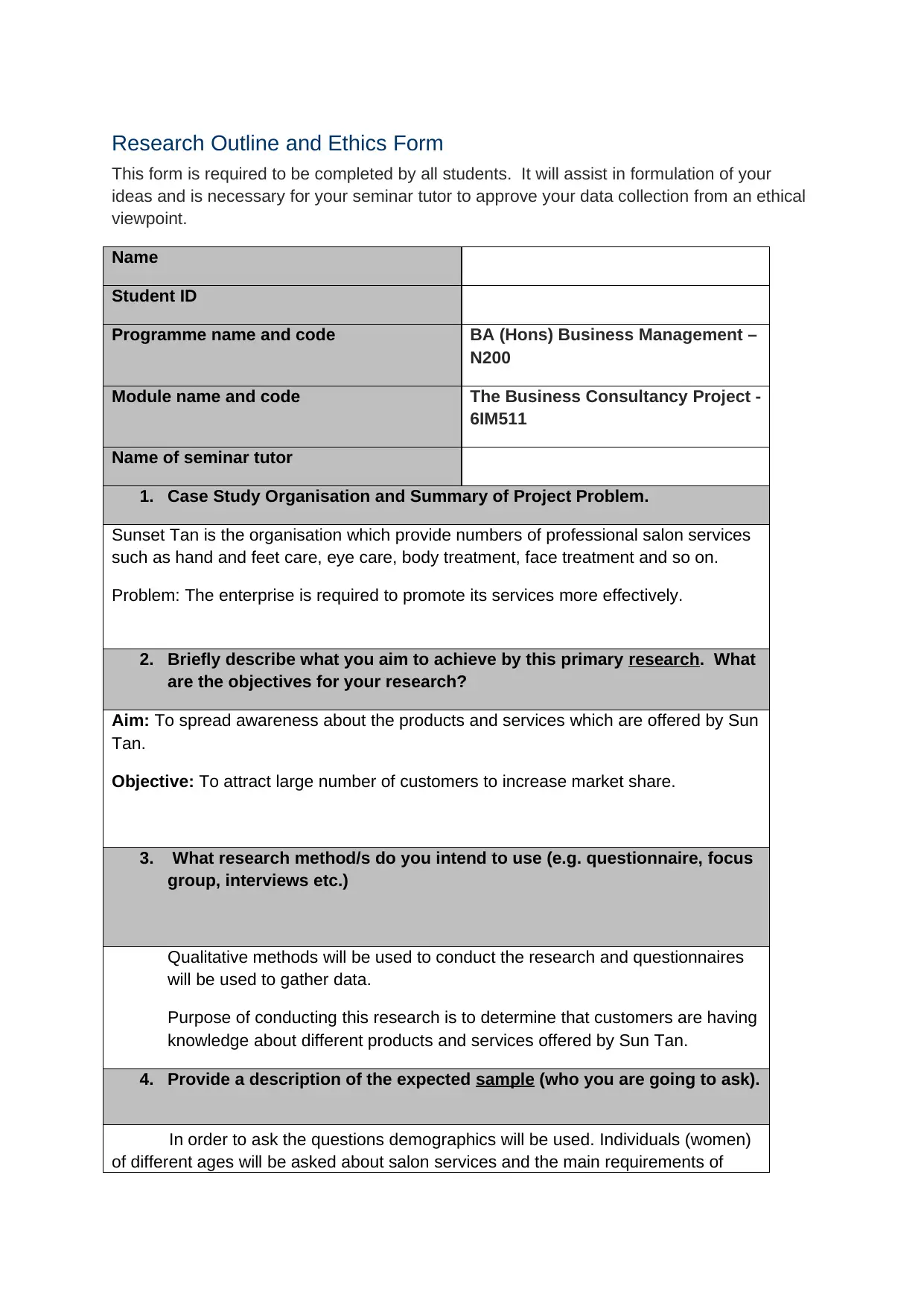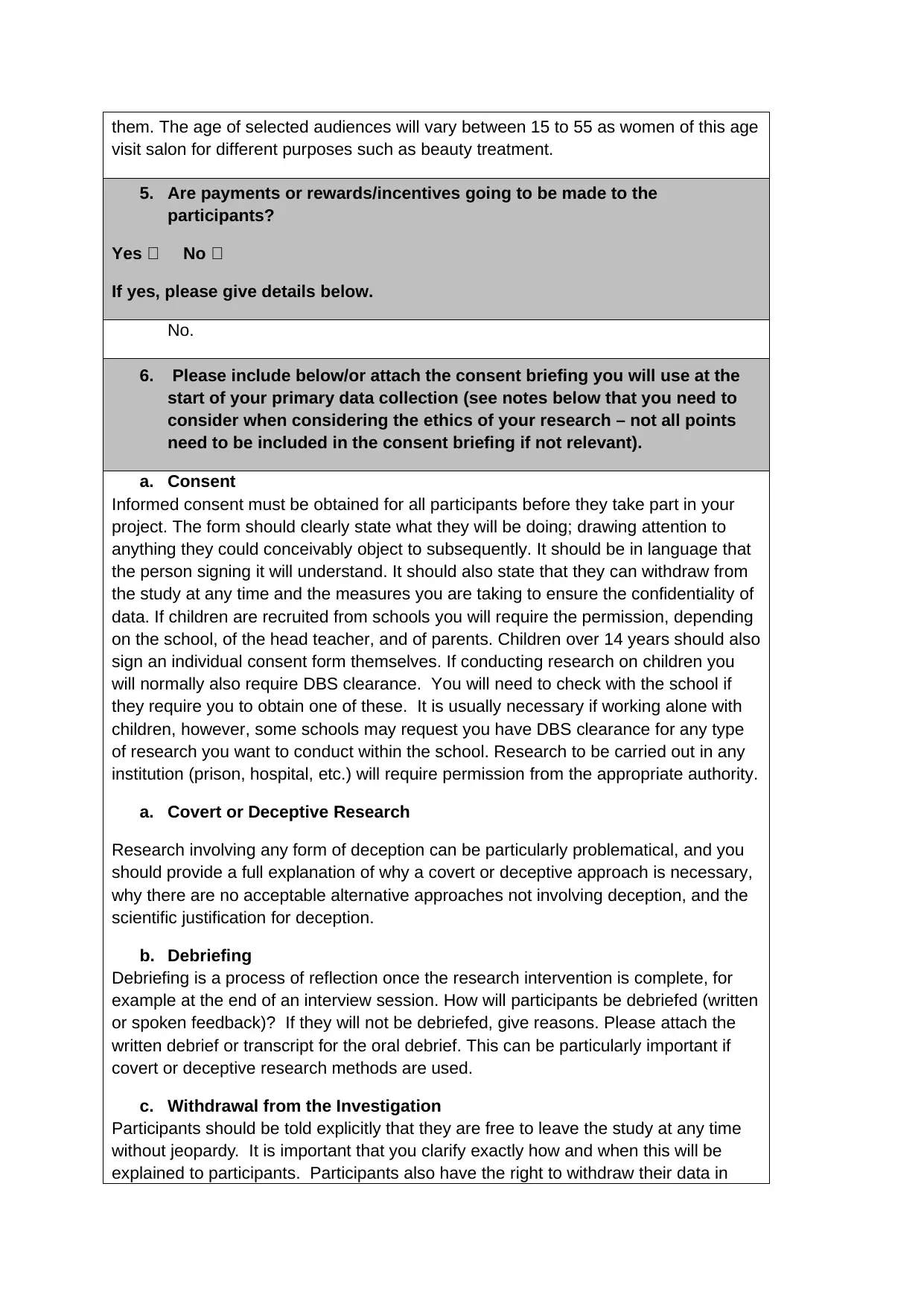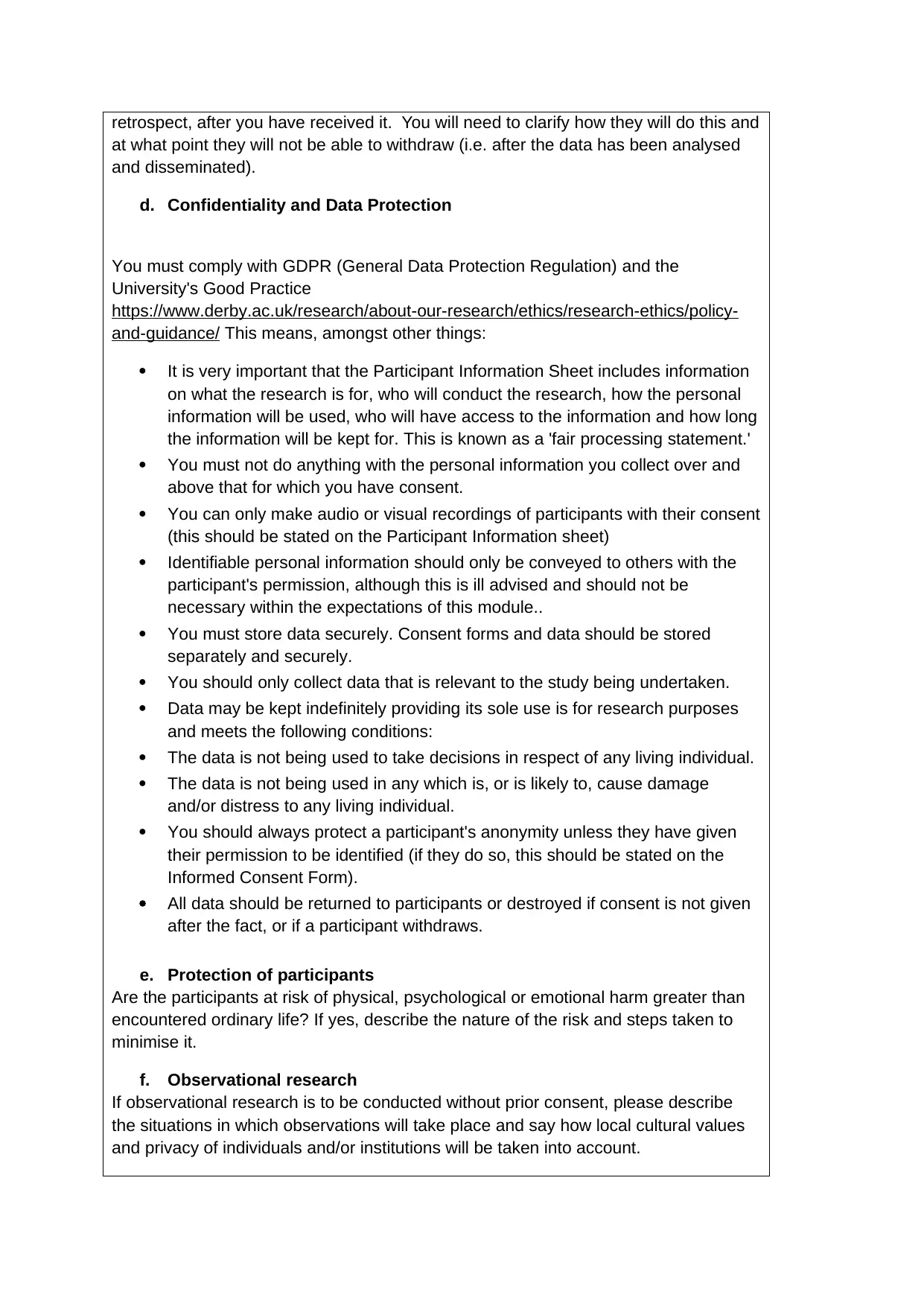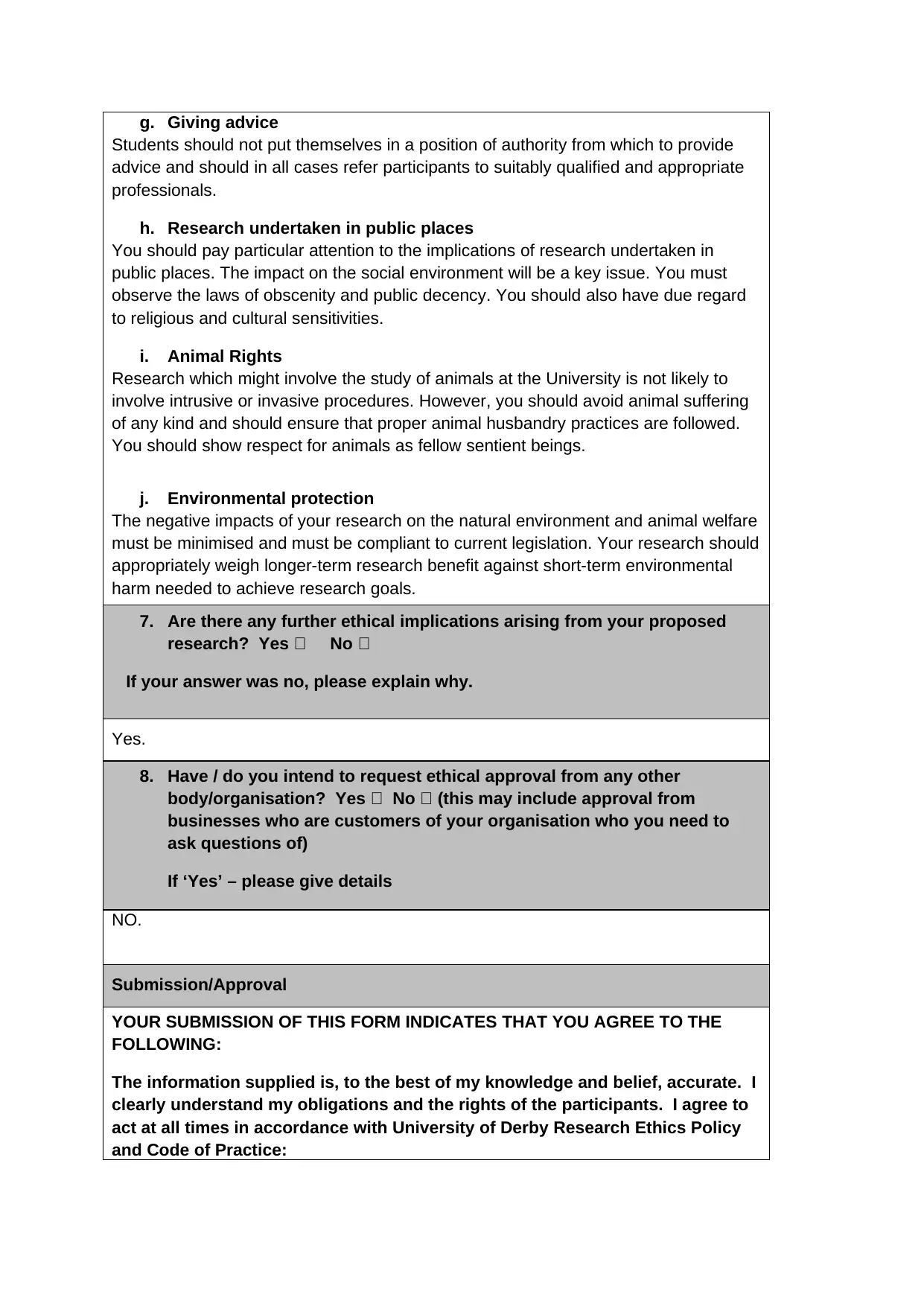University of Derby: Business Consultancy Project Research Ethics Form
VerifiedAdded on 2023/01/17
|5
|1636
|63
Homework Assignment
AI Summary
This document presents a completed research ethics form for a Business Consultancy Project, undertaken by a student in the BA (Hons) Business Management program at the University of Derby. The form outlines the project's problem, which involves promoting Sunset Tan's services more effectively, aiming to increase market share by attracting more customers. The research will employ qualitative methods, specifically questionnaires, targeting women aged 15-55 to gather data on their salon service preferences. The form addresses ethical considerations, including informed consent, participant withdrawal, data confidentiality, and potential risks. It emphasizes adherence to GDPR and the University's Research Ethics Policy. The student confirms understanding of obligations and participant rights, and agrees to act in accordance with the University's policy. The form's submission is required for seminar tutor approval before any primary data collection commences.

Research Outline and Ethics Form
This form is required to be completed by all students. It will assist in formulation of your
ideas and is necessary for your seminar tutor to approve your data collection from an ethical
viewpoint.
Name
Student ID
Programme name and code BA (Hons) Business Management –
N200
Module name and code The Business Consultancy Project -
6IM511
Name of seminar tutor
1. Case Study Organisation and Summary of Project Problem.
Sunset Tan is the organisation which provide numbers of professional salon services
such as hand and feet care, eye care, body treatment, face treatment and so on.
Problem: The enterprise is required to promote its services more effectively.
2. Briefly describe what you aim to achieve by this primary research. What
are the objectives for your research?
Aim: To spread awareness about the products and services which are offered by Sun
Tan.
Objective: To attract large number of customers to increase market share.
3. What research method/s do you intend to use (e.g. questionnaire, focus
group, interviews etc.)
Qualitative methods will be used to conduct the research and questionnaires
will be used to gather data.
Purpose of conducting this research is to determine that customers are having
knowledge about different products and services offered by Sun Tan.
4. Provide a description of the expected sample (who you are going to ask).
In order to ask the questions demographics will be used. Individuals (women)
of different ages will be asked about salon services and the main requirements of
This form is required to be completed by all students. It will assist in formulation of your
ideas and is necessary for your seminar tutor to approve your data collection from an ethical
viewpoint.
Name
Student ID
Programme name and code BA (Hons) Business Management –
N200
Module name and code The Business Consultancy Project -
6IM511
Name of seminar tutor
1. Case Study Organisation and Summary of Project Problem.
Sunset Tan is the organisation which provide numbers of professional salon services
such as hand and feet care, eye care, body treatment, face treatment and so on.
Problem: The enterprise is required to promote its services more effectively.
2. Briefly describe what you aim to achieve by this primary research. What
are the objectives for your research?
Aim: To spread awareness about the products and services which are offered by Sun
Tan.
Objective: To attract large number of customers to increase market share.
3. What research method/s do you intend to use (e.g. questionnaire, focus
group, interviews etc.)
Qualitative methods will be used to conduct the research and questionnaires
will be used to gather data.
Purpose of conducting this research is to determine that customers are having
knowledge about different products and services offered by Sun Tan.
4. Provide a description of the expected sample (who you are going to ask).
In order to ask the questions demographics will be used. Individuals (women)
of different ages will be asked about salon services and the main requirements of
Paraphrase This Document
Need a fresh take? Get an instant paraphrase of this document with our AI Paraphraser

them. The age of selected audiences will vary between 15 to 55 as women of this age
visit salon for different purposes such as beauty treatment.
5. Are payments or rewards/incentives going to be made to the
participants?
Yes No
If yes, please give details below.
No.
6. Please include below/or attach the consent briefing you will use at the
start of your primary data collection (see notes below that you need to
consider when considering the ethics of your research – not all points
need to be included in the consent briefing if not relevant).
a. Consent
Informed consent must be obtained for all participants before they take part in your
project. The form should clearly state what they will be doing; drawing attention to
anything they could conceivably object to subsequently. It should be in language that
the person signing it will understand. It should also state that they can withdraw from
the study at any time and the measures you are taking to ensure the confidentiality of
data. If children are recruited from schools you will require the permission, depending
on the school, of the head teacher, and of parents. Children over 14 years should also
sign an individual consent form themselves. If conducting research on children you
will normally also require DBS clearance. You will need to check with the school if
they require you to obtain one of these. It is usually necessary if working alone with
children, however, some schools may request you have DBS clearance for any type
of research you want to conduct within the school. Research to be carried out in any
institution (prison, hospital, etc.) will require permission from the appropriate authority.
a. Covert or Deceptive Research
Research involving any form of deception can be particularly problematical, and you
should provide a full explanation of why a covert or deceptive approach is necessary,
why there are no acceptable alternative approaches not involving deception, and the
scientific justification for deception.
b. Debriefing
Debriefing is a process of reflection once the research intervention is complete, for
example at the end of an interview session. How will participants be debriefed (written
or spoken feedback)? If they will not be debriefed, give reasons. Please attach the
written debrief or transcript for the oral debrief. This can be particularly important if
covert or deceptive research methods are used.
c. Withdrawal from the Investigation
Participants should be told explicitly that they are free to leave the study at any time
without jeopardy. It is important that you clarify exactly how and when this will be
explained to participants. Participants also have the right to withdraw their data in
visit salon for different purposes such as beauty treatment.
5. Are payments or rewards/incentives going to be made to the
participants?
Yes No
If yes, please give details below.
No.
6. Please include below/or attach the consent briefing you will use at the
start of your primary data collection (see notes below that you need to
consider when considering the ethics of your research – not all points
need to be included in the consent briefing if not relevant).
a. Consent
Informed consent must be obtained for all participants before they take part in your
project. The form should clearly state what they will be doing; drawing attention to
anything they could conceivably object to subsequently. It should be in language that
the person signing it will understand. It should also state that they can withdraw from
the study at any time and the measures you are taking to ensure the confidentiality of
data. If children are recruited from schools you will require the permission, depending
on the school, of the head teacher, and of parents. Children over 14 years should also
sign an individual consent form themselves. If conducting research on children you
will normally also require DBS clearance. You will need to check with the school if
they require you to obtain one of these. It is usually necessary if working alone with
children, however, some schools may request you have DBS clearance for any type
of research you want to conduct within the school. Research to be carried out in any
institution (prison, hospital, etc.) will require permission from the appropriate authority.
a. Covert or Deceptive Research
Research involving any form of deception can be particularly problematical, and you
should provide a full explanation of why a covert or deceptive approach is necessary,
why there are no acceptable alternative approaches not involving deception, and the
scientific justification for deception.
b. Debriefing
Debriefing is a process of reflection once the research intervention is complete, for
example at the end of an interview session. How will participants be debriefed (written
or spoken feedback)? If they will not be debriefed, give reasons. Please attach the
written debrief or transcript for the oral debrief. This can be particularly important if
covert or deceptive research methods are used.
c. Withdrawal from the Investigation
Participants should be told explicitly that they are free to leave the study at any time
without jeopardy. It is important that you clarify exactly how and when this will be
explained to participants. Participants also have the right to withdraw their data in

retrospect, after you have received it. You will need to clarify how they will do this and
at what point they will not be able to withdraw (i.e. after the data has been analysed
and disseminated).
d. Confidentiality and Data Protection
You must comply with GDPR (General Data Protection Regulation) and the
University's Good Practice
https://www.derby.ac.uk/research/about-our-research/ethics/research-ethics/policy-
and-guidance/ This means, amongst other things:
It is very important that the Participant Information Sheet includes information
on what the research is for, who will conduct the research, how the personal
information will be used, who will have access to the information and how long
the information will be kept for. This is known as a 'fair processing statement.'
You must not do anything with the personal information you collect over and
above that for which you have consent.
You can only make audio or visual recordings of participants with their consent
(this should be stated on the Participant Information sheet)
Identifiable personal information should only be conveyed to others with the
participant's permission, although this is ill advised and should not be
necessary within the expectations of this module..
You must store data securely. Consent forms and data should be stored
separately and securely.
You should only collect data that is relevant to the study being undertaken.
Data may be kept indefinitely providing its sole use is for research purposes
and meets the following conditions:
The data is not being used to take decisions in respect of any living individual.
The data is not being used in any which is, or is likely to, cause damage
and/or distress to any living individual.
You should always protect a participant's anonymity unless they have given
their permission to be identified (if they do so, this should be stated on the
Informed Consent Form).
All data should be returned to participants or destroyed if consent is not given
after the fact, or if a participant withdraws.
e. Protection of participants
Are the participants at risk of physical, psychological or emotional harm greater than
encountered ordinary life? If yes, describe the nature of the risk and steps taken to
minimise it.
f. Observational research
If observational research is to be conducted without prior consent, please describe
the situations in which observations will take place and say how local cultural values
and privacy of individuals and/or institutions will be taken into account.
at what point they will not be able to withdraw (i.e. after the data has been analysed
and disseminated).
d. Confidentiality and Data Protection
You must comply with GDPR (General Data Protection Regulation) and the
University's Good Practice
https://www.derby.ac.uk/research/about-our-research/ethics/research-ethics/policy-
and-guidance/ This means, amongst other things:
It is very important that the Participant Information Sheet includes information
on what the research is for, who will conduct the research, how the personal
information will be used, who will have access to the information and how long
the information will be kept for. This is known as a 'fair processing statement.'
You must not do anything with the personal information you collect over and
above that for which you have consent.
You can only make audio or visual recordings of participants with their consent
(this should be stated on the Participant Information sheet)
Identifiable personal information should only be conveyed to others with the
participant's permission, although this is ill advised and should not be
necessary within the expectations of this module..
You must store data securely. Consent forms and data should be stored
separately and securely.
You should only collect data that is relevant to the study being undertaken.
Data may be kept indefinitely providing its sole use is for research purposes
and meets the following conditions:
The data is not being used to take decisions in respect of any living individual.
The data is not being used in any which is, or is likely to, cause damage
and/or distress to any living individual.
You should always protect a participant's anonymity unless they have given
their permission to be identified (if they do so, this should be stated on the
Informed Consent Form).
All data should be returned to participants or destroyed if consent is not given
after the fact, or if a participant withdraws.
e. Protection of participants
Are the participants at risk of physical, psychological or emotional harm greater than
encountered ordinary life? If yes, describe the nature of the risk and steps taken to
minimise it.
f. Observational research
If observational research is to be conducted without prior consent, please describe
the situations in which observations will take place and say how local cultural values
and privacy of individuals and/or institutions will be taken into account.
⊘ This is a preview!⊘
Do you want full access?
Subscribe today to unlock all pages.

Trusted by 1+ million students worldwide

g. Giving advice
Students should not put themselves in a position of authority from which to provide
advice and should in all cases refer participants to suitably qualified and appropriate
professionals.
h. Research undertaken in public places
You should pay particular attention to the implications of research undertaken in
public places. The impact on the social environment will be a key issue. You must
observe the laws of obscenity and public decency. You should also have due regard
to religious and cultural sensitivities.
i. Animal Rights
Research which might involve the study of animals at the University is not likely to
involve intrusive or invasive procedures. However, you should avoid animal suffering
of any kind and should ensure that proper animal husbandry practices are followed.
You should show respect for animals as fellow sentient beings.
j. Environmental protection
The negative impacts of your research on the natural environment and animal welfare
must be minimised and must be compliant to current legislation. Your research should
appropriately weigh longer-term research benefit against short-term environmental
harm needed to achieve research goals.
7. Are there any further ethical implications arising from your proposed
research? Yes No
If your answer was no, please explain why.
Yes.
8. Have / do you intend to request ethical approval from any other
body/organisation? Yes No (this may include approval from
businesses who are customers of your organisation who you need to
ask questions of)
If ‘Yes’ – please give details
NO.
Submission/Approval
YOUR SUBMISSION OF THIS FORM INDICATES THAT YOU AGREE TO THE
FOLLOWING:
The information supplied is, to the best of my knowledge and belief, accurate. I
clearly understand my obligations and the rights of the participants. I agree to
act at all times in accordance with University of Derby Research Ethics Policy
and Code of Practice:
Students should not put themselves in a position of authority from which to provide
advice and should in all cases refer participants to suitably qualified and appropriate
professionals.
h. Research undertaken in public places
You should pay particular attention to the implications of research undertaken in
public places. The impact on the social environment will be a key issue. You must
observe the laws of obscenity and public decency. You should also have due regard
to religious and cultural sensitivities.
i. Animal Rights
Research which might involve the study of animals at the University is not likely to
involve intrusive or invasive procedures. However, you should avoid animal suffering
of any kind and should ensure that proper animal husbandry practices are followed.
You should show respect for animals as fellow sentient beings.
j. Environmental protection
The negative impacts of your research on the natural environment and animal welfare
must be minimised and must be compliant to current legislation. Your research should
appropriately weigh longer-term research benefit against short-term environmental
harm needed to achieve research goals.
7. Are there any further ethical implications arising from your proposed
research? Yes No
If your answer was no, please explain why.
Yes.
8. Have / do you intend to request ethical approval from any other
body/organisation? Yes No (this may include approval from
businesses who are customers of your organisation who you need to
ask questions of)
If ‘Yes’ – please give details
NO.
Submission/Approval
YOUR SUBMISSION OF THIS FORM INDICATES THAT YOU AGREE TO THE
FOLLOWING:
The information supplied is, to the best of my knowledge and belief, accurate. I
clearly understand my obligations and the rights of the participants. I agree to
act at all times in accordance with University of Derby Research Ethics Policy
and Code of Practice:
Paraphrase This Document
Need a fresh take? Get an instant paraphrase of this document with our AI Paraphraser

https://www.derby.ac.uk/research/about-our-research/ethics/research-ethics/
YOUR SEMINAR TUTOR WILL LOOK AT YOUR ETHICS FORM AND APPROVE
(OR NOT) YOUR RESEARCH. YOU MUST NOT CARRY OUT ANY PRIMARY
DATA COLLECTION UNTIL APPROVED. THE SUBMISSION DATE FOR THIS
FORM IS NO LATER THAN 1st FEBRUARY. IF YOU WISH TO CARRY OUT YOUR
RESEARCH BEFORE THIS DATE, YOU MUST TELL YOUR SEMINAR TUTOR
THAT YOU HAVE SUBMITTED THIS FORM EARLY.
YOUR SEMINAR TUTOR WILL LOOK AT YOUR ETHICS FORM AND APPROVE
(OR NOT) YOUR RESEARCH. YOU MUST NOT CARRY OUT ANY PRIMARY
DATA COLLECTION UNTIL APPROVED. THE SUBMISSION DATE FOR THIS
FORM IS NO LATER THAN 1st FEBRUARY. IF YOU WISH TO CARRY OUT YOUR
RESEARCH BEFORE THIS DATE, YOU MUST TELL YOUR SEMINAR TUTOR
THAT YOU HAVE SUBMITTED THIS FORM EARLY.
1 out of 5
Related Documents
Your All-in-One AI-Powered Toolkit for Academic Success.
+13062052269
info@desklib.com
Available 24*7 on WhatsApp / Email
![[object Object]](/_next/static/media/star-bottom.7253800d.svg)
Unlock your academic potential
Copyright © 2020–2026 A2Z Services. All Rights Reserved. Developed and managed by ZUCOL.





![Research Ethics Approval Form - [College Name] - Semester 1](/_next/image/?url=https%3A%2F%2Fdesklib.com%2Fmedia%2Fimages%2Fzv%2Fa46e28e263b143ee83924d0b94c9ab82.jpg&w=256&q=75)